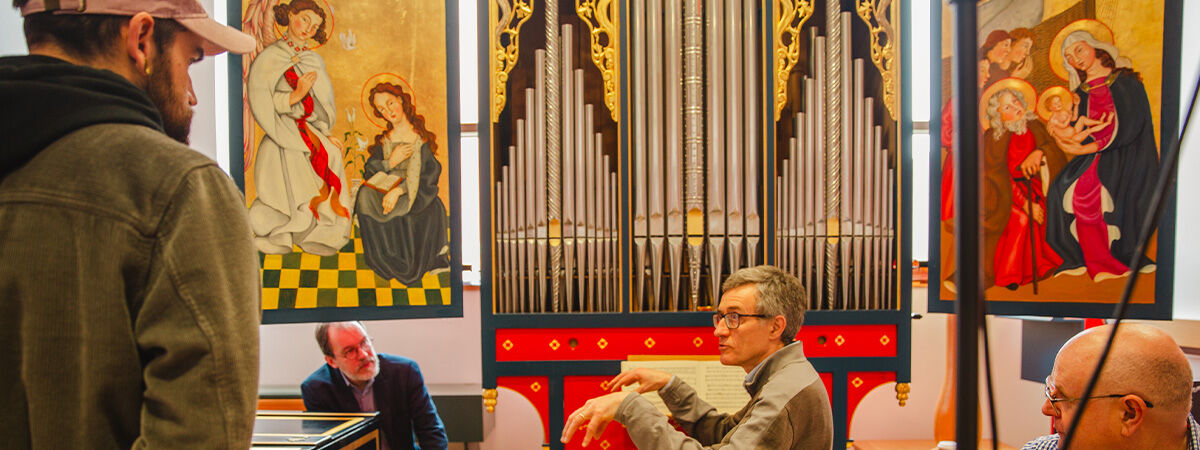Early Music and Sonic Heritage
The Early Music and Sonic Heritage research cluster is essentially concerned with 21st century modes of understanding, performing, and experiencing late-Medieval and Renaissance music. We are especially interested in interdisciplinary synergies between Early (Western) Music and other forms of cultural heritage.

Key topics of our research include:
- Late-Medieval and Renaissance music theory and its relationship to practice.
- The historical, institutional and intellectual context of music, musical writings and pedagogy, manuscript production, and associated performance implications in the 15th and 16th centuries.
- Relationships between music, civic and ecclesiastical ritual and the built environment, c.1450-1650.
- Historical instruments, archaeoacoustics, and historical performance space.
- Historically informed performance, and technologically-mediated performance, of Medieval and Renaissance music.
- The editing of musical and music-theoretical texts from this period, especially as enabled and enhanced by newly developed digital technologies.
- Late medieval palaeography and codicology, including the use of new and emerging digital tools (e.g. optical character recognition and machine learning technologies).
- Disseminating a deeper understanding of late medieval musical notation, and its relationship to modern transcribed notations and editions, to non-specialist performers and editors.
- A wider exploration and understanding of early music, its reception, representations, cultural meanings and appropriations in the modern world, especially as mediated by 21st-century technologies.
The core research of the cluster currently derives from a major AHRC-funded project, ‘Aural Histories: Coventry, c.1451-1642’ (2022-25; project value c.£900k FEC), investigating the experience of music in late-medieval and early modern Coventry through performance and recording in digital reconstructions of its lost performing spaces. The research centres on music that might have been heard within and between the buildings at the civic and ecclesiastical centre of the city, most notably including St Michael’s parish church (and later cathedral) which was destroyed in the blitz of 1940, Holy Trinity parish church and St Mary’s Hall. Taking a long chronological view over two centuries of religious and political upheaval, these buildings can be understood as dynamic spaces that change both through different phases of construction and furnishing, and in their use as ritual and performative space.
The cluster also builds on the legacy of two earlier AHRC-funded projects: Phase 1 ‘The Complete Theoretical Works of Johannes Tinctoris: A New Digital Edition’, ran from 2011 to 2014 (project value c.£400k; funding extended by BCU to 2016); Phase 2 ‘Interpreting the Mensural Notation of Music: An Expert System Based on the Theory of Johannes Tinctoris’ runs from 2017 to 2021 (project value c.£800k).
Part of the remit of this cluster is to ensure the scholarly legacy and continued impact of these projects through maintenance and further development of the website, www.earlymusictheory.org, through which many of the substantive research outputs (including translations and editions) are disseminated.
Principal research objectives:
- To maintain and further develop our status as a world-leading centre for late-Medieval and early-Renaissance music.
- To extend our interdisciplinary working as a foundation for further, ambitious research proposals in the Cultural Heritage space, targeting UKRI and EU Horizon.
- To grow and develop our expertise in new and emerging digital humanities methodologies.
- To explore new and innovative methods of disseminating our research to reach wider audiences and maximise impact.
People (RBC):
- Professor Jamie Savan (Cluster lead)
- Dr Adam Whittaker (Cluster co-lead)
- Dr Helen Roberts
- Dr Simon Hall
- Reiss Smith
People (Emeritus and Visiting):
- Professor Ronald Woodley (Emeritus Professor)
- Dr Jeffrey Dean (Visiting Reader in Early Music Theory)
- Dr Christian Goursaud (Visiting Research Fellow in Early Music Theory)
People (wider BCU):
- Professor Islah-Ali MacLachlan (Acoustics)
- Dr Mattia Colombo (Computer games design)
People (external):
- Professor Andrew Kirkman (Musicology, University of Birmingham)
- Professor Magnus Williamson (Musicology, Newcastle University)
- Professor Christian Frost (Architecture, London Metropolitan University)
- Professor Carlo Harvey (Computer science, Manchester Metropolitan University)